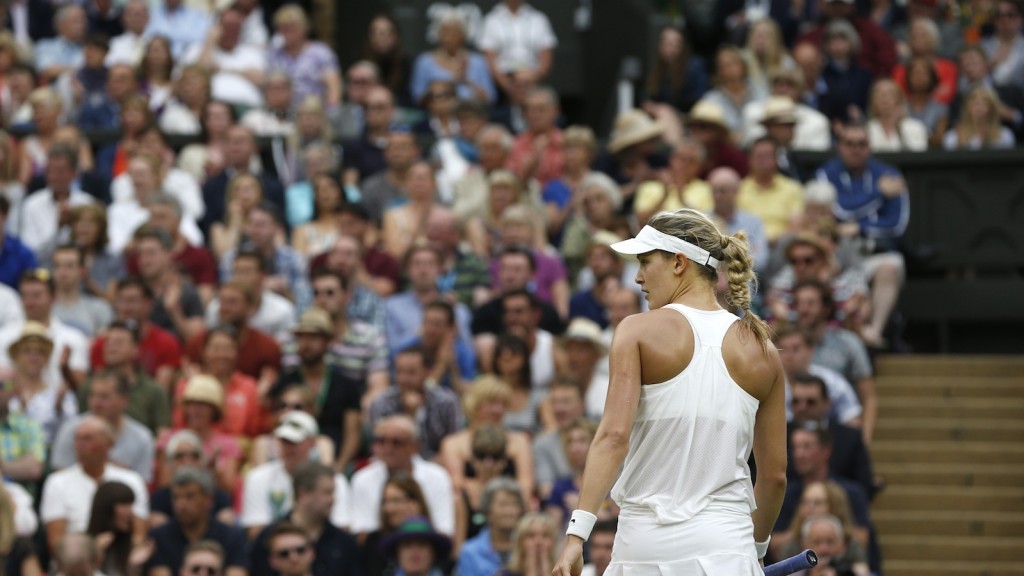Mental strength key to Eugenie Bouchard’s Wimbledon hopes
For now, Bouchard’s success all comes down to mind games
Eugenie Bouchard of Canada looks across the court before serving to Alize Cornet of France during their women’s singles match at the All England Lawn Tennis Championships in Wimbledon, London, Monday, June 30, 2014. (AP Photo/Pavel Golovkin)
Share
Eugenie Bouchard plays in the Wimbledon semi-finals this morning. The following story on Bouchard was first published in Sportsnet Magazine July 2, 2014.
It was months before she would appear in her third Grand Slam semifinal, but the soon-to-be tennis star already had a precise sense of what would take her career to the lofty heights she set for herself.
“Tennis is 90 per cent mental,” Eugenie Bouchard explained, eager to provide an answer to a question I had barely began to ask. “That’s what I always say.”
The 20-year-old was in Toronto at the Tennis Canada headquarters last winter and had just wrapped up a photo shoot for Sportsnet Magazine as 2013′s “Breakout Athlete of the Year,” shortly after being named WTA’s “Newcomer of the Year” in her first full year on tour.
Her debut season had many big moments; from playing on centre court at Wimbledon where she had been crowned a junior champion the year before, to a face-off at the French Open with her childhood idol. During a lengthy conversation, she detailed how she expected — not hoped — there would be plenty more to come in 2014.
So when it came down to the question of “how,” it became obvious in her response that Bouchard was acutely aware of the role the mental element of the game plays in this sport.
Watching her perform in Wednesday’s quarter-finals, Bouchard clearly still is. Despite all the work she had done to her game, that might just be the biggest key for her to take yet another step forward in her career ahead of Thursday’s semifinal — Bouchard’s third Grand Slam semifinal in as many tournaments.
“The mental side is a big part of [her success],” explains Tennis Canada national coach and FedCup captain Sylvain Bruneau over the phone from London. “Everybody talks about it, but what she does really well is this ability to go point-by-point and not think about what happened in the past or start thinking ahead. She is very good at staying in the moment and keeping her mind on task. It’s a really big asset.”
Bruneau goes on to point out that it’s that particular aspect of her game which allows Bouchard to come through in what, from afar, may appear to be bleak moments on the court.
That was evident on Wednesday morning.
After cruising through the first set and climbing to a 4-1 lead in the second, her opponent came back to tie things at 4-4. When it seemed her momentum had waned, Bouchard fought through, hitting her finest shots of the match up 5-4.
That toughness, as well as the ability to locate and categorize the hundreds of thoughts shooting through your brain in the heat of competition, helps separate recreational players from club standouts, Tour hopefuls from top-100 players, semifinalists from finalists, and finalists from champions.
It’s especially critical in singles, particularly in these Grand Slam matches where communication with coaches is prohibited. It’s just you — alone to battle your thoughts, stay focused and execute your game plan.
Players react to that reality in just about every way you can imagine. Some keep a constant inner dialogue just to have somebody to talk to; others scream expletives at themselves when things turn sour. Some players face a tough moment and become withdrawn, seemingly conceding defeat before a point is played.
But it’s the great ones, with a few exceptions, who can keep it together and, like Bruneau detailed, simply move on to the next point.
The gold standard is probably Roger Federer, whose stoicism on the court borders on inhuman. Federer will face Thornhill, Ont., native Milos Raonic on Thursday, also in the semifinals — an incredible accomplishment for both Bouchard and Roanic, as well as the development of the sport in this country and its governing body over the past decade.
But that’s another story altogether.
As Bouchard’s phenomenal 2014 rolls along, her game continues to grow — more aggressive with every match and yet quite tactical, always on the prowl for an opportunity to charge the net for a put-away volley or slam.
And although her name will appear in the top 10 of WTA’s player rankings on Monday for the first time ever, she’s still not close to where she wants to be. Making the finals at Wimbledon would be a massive accomplishment, of course, but it won’t be easy: her opponent, No. 3 ranked Simona Halep, is a smart, selective player who represents Bouchard’s toughest test of the tournament.
Who’s to say how long Bouchard’s Wimbledon run will go, or how far her career will ultimately take her. But for now, it all comes down to mind games.
